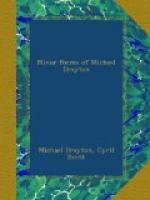Sonet 45
Thou leaden braine, which
censur’st what I write,
And say’st my lines
be dull and doe not moue,
I meruaile not thou feelst
not my delight,
Which neuer felt my fiery
tuch of loue.
But thou whose pen hath like
a Pack-horse seru’d,
Whose stomack vnto gaule hath
turn’d thy foode,
Whose sences like poore prisoners
hunger-staru’d,
Whose griefe hath parch’d
thy body, dry’d thy blood.
Thou which hast scorned life,
and hated death,
And in a moment mad, sober,
glad, and sorry,
Thou which hast band thy thoughts
and curst thy breath,
With thousand plagues more
then in purgatory.
Thou thus whose
spirit Loue in his fire refines,
Come thou and
reade, admire, applaud my lines.
Sonet 55
Truce gentle loue, a parly
now I craue,
Me thinks, ’tis long
since first these wars begun,
Nor thou nor I, the better
yet can haue:
Bad is the match where neither
party wone.
I offer free conditions of
faire peace,
My hart for hostage, that
it shall remaine,
Discharge our forces heere,
let malice cease,
So for my pledge, thou giue
me pledge againe.
Or if nothing but death will
serue thy turne,
Still thirsting for subuersion
of my state;
Doe what thou canst, raze,
massacre, and burne,
Let the world see the vtmost
of thy hate:
I send defiance,
since if ouerthrowne,
Thou vanquishing,
the conquest is mine owne.
Sonet 56
A Consonet
Eyes with your teares, blind
if you bee,
Why haue these teares such
eyes to see,
Poore eyes, if yours teares
cannot moue,
My teares, eyes, then must
mone my loue,
Then eyes, since
you haue lost your sight,
Weepe still, and
teares shall lend you light,
Till both desolu’d,
and both want might.
No, no, cleere eyes, you are
not blind,
But in my teares discerne
my mind:
Teares be the language which
you speake,
Which my hart wanting, yet
must breake;
My tongue must
cease to tell my wrongs,
And make my sighs
to get them tongs,
Yet more then
this to her belongs.
Sonet 57
To Lucie Countesse of Bedford
Great Lady, essence of my
chiefest good,
Of the most pure and finest
tempred spirit,
Adorn’d with gifts,
enobled by thy blood,
Which by discent true vertue
do’st inherit:
That vertue which no fortune
can depriue,
Which thou by birth tak’st
from thy gracious mother,
Whose royall minds with equall
motion striue,
Which most in honour shall
excell the other;
Vnto thy fame my Muse herself




